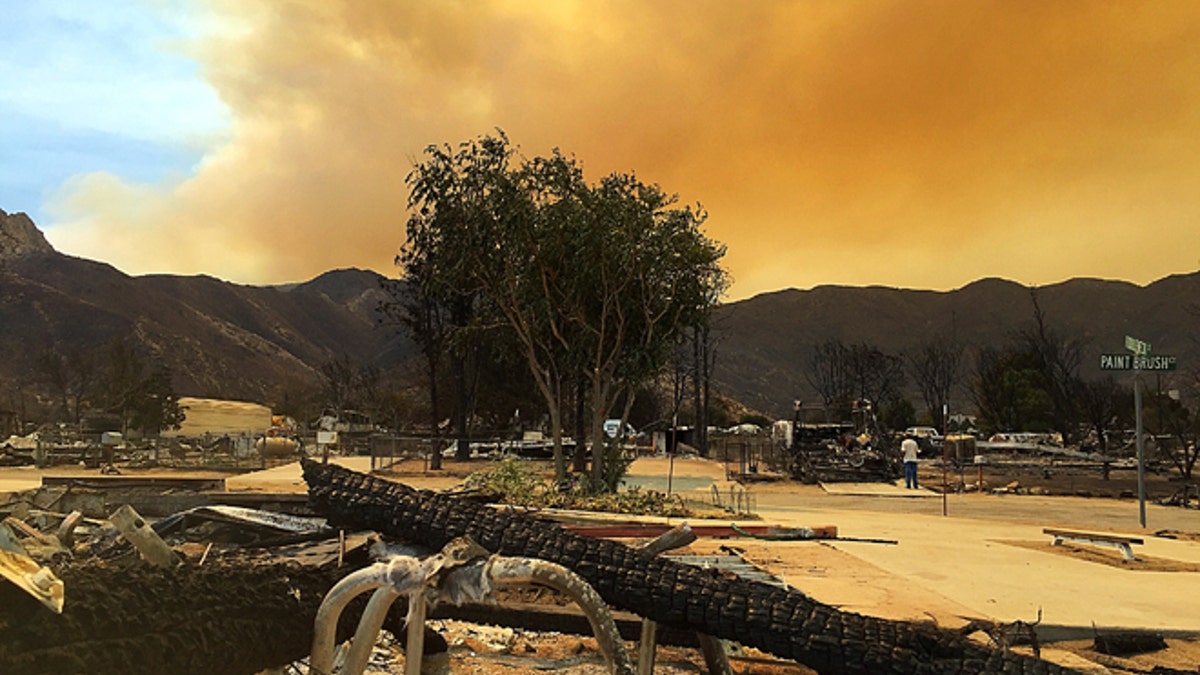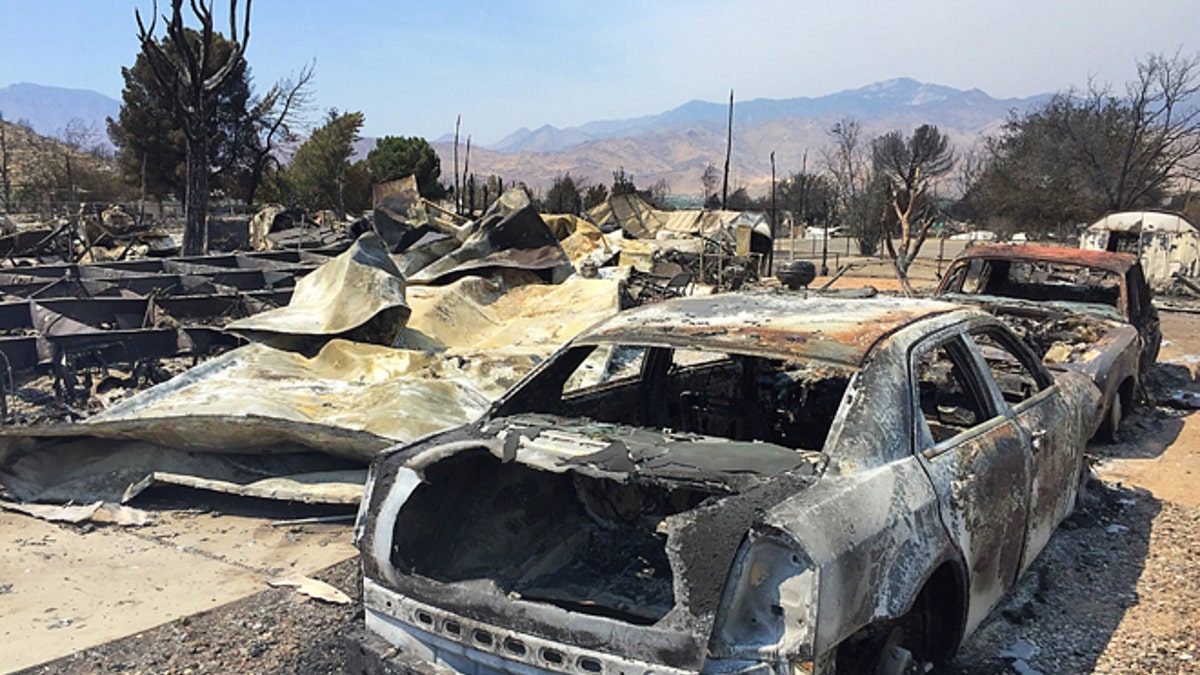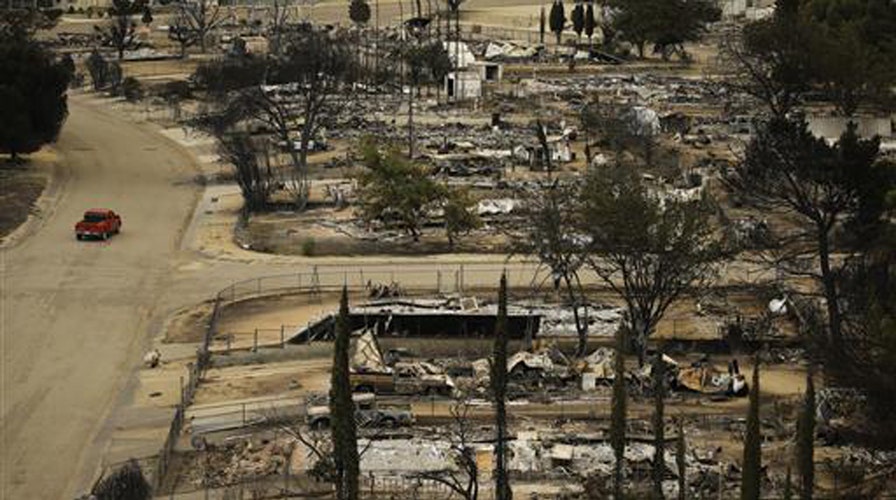Wildfires continued to burn in California Sunday, scorching nearly 60,000 acres and claiming two lives as 4,500 firefighters battled the six blazes, which stretched from the Klammath National Forest in Northern California to the Mexican border in San Diego County, according to the California Department of Forestry and Fire Protection, The Los Angeles Times reported.
The most destructive fire is in Kern County, known as the Erskine fire, which has burned more than 35,000 acres and destroyed more than 150 homes. At least two people were killed in the Erskine fire, and authorities have reported what may be a third victim. The Kern fire is about 5 percent contained.
Gusty winds and low humidity put parts of southern and central California under continued fire warnings, including the mountains of Los Angeles, Ventura, Santa Barbara and Kern counties.

June 26, 2016: The remains of homes devastated by a wildfire in Kern County, Calif. (Will Carr/Fox News)
The tally rose to 150 homes from 80 homes as firefighters began going through neighborhoods to count houses and mobile homes incinerated by the wildfires.
In one mobile home, they found what appears to be a set of human remains, but because they were so badly burned forensic investigators will have to determine whether they belonged to a person or animal, Kern County Sheriff's spokesman Ray Pruitt said.
Entire blocks were reduced to rubble, and at least 2,500 homes remained threatened.
The winds that drove the fire through small southern Sierra Nevada communities calmed by late Saturday afternoon, helping firefighters gain access to the fire line. However, hot weather and low humidity remained a worry.
"That's something we have to keep an eye on. It could spark another disaster," Kern County fire Engineer Anthony Romero said.
About 1,140 firefighters battled the Erskine blaze.
Gov. Jerry Brown declared a state of emergency, freeing up money and resources to fight the fire and to clean up in the aftermath. The Federal Emergency Management Agency also authorized the use of funds for firefighting efforts, fire officials said
Since it began Thursday, the Erskine fire – the largest of the area wildfires -- has swept through 35,711 acres — nearly 56 square miles — of parched brush and timber. It moved so quickly that some residents barely had time to escape — and two didn't.
An elderly couple apparently was overcome by smoke as they tried to flee, county Sheriff Donny Youngblood said. Their bodies were found Friday, but their names haven't been released.
Allen Montgomery, 40, who lives across the street from the couple, said he didn't know their names but understood that the woman was bedridden. He said the house disappeared in the smoke when he fled his home on Thursday.
"There was so much smoke you could barely see it," he said.

June 26, 2016: The remains of homes devastated by a wildfire in Kern County, Calif. (Will Carr/Fox News)
When he came back Friday, Montgomery said he saw the man's body about 20 feet from the house.
Everett Evans, 45, fled Thursday as the fire came down a mountain with a roar toward his South Lake mobile home. "When you hear a freight train, it's time to leave. You could hear it, you could see it, you could smell it," he said.
Evans said he knocked on doors to get neighbors to leave. Evans and his father, his son and his son's girlfriend were in the convoy.
But he has nothing left to come back to. Virtually no homes survived in his neighborhood.
Shiela McFarland, 67, from Mountain Mesa, left her home three days ago, taking her computer, cellphone, papers and her miniature poodle, Snuggles.
At an evacuation center, she slept on a cot outdoors next to his kennel.
McFarland said she didn't know whether her home survived, but she was philosophical.
"It doesn't matter if I've lost everything," she said Saturday. "I've got my little dog, my kids and my grandkids. I've seen other people in worse shape."
The fire tore through small communities of houses and mobile homes that surround the lake — actually a reservoir — and the Kern River, a popular spot for fishing and whitewater rafting. The communities are nestled in foothills of the Sierra Nevada, a mountain range that runs hundreds of miles north and south through eastern California.
Scorching heat and tinder-dry conditions across the West have contributed to massive wildfires in the past week that have destroyed properties and sent residents to seek shelter and hope for the best.
Jim Terry and his neighbor took a chance and used garden hoses to keep their rooftops and trees damp as flames raced toward them.
He gave up when thick, black smoke rolled toward him, Terry said.
"I never quit in my life but it was time to throw in the towel," he said Saturday when he returned to check on his house.
The gamble paid off. Three houses on his side of the street, including his, were saved.
A neighbor's house across the street was reduced to a pile of smoldering rubble.
According to the Los Angeles Times, in San Diego County, the Border fire spanned 7,609 acres and had destroyed five homes. The Border fire was about 70 percent contained as of Saturday, while the San Gabriel Complex fire in Los Angeles County – which destroyed about 5,285 acres – was about 50 percent contained.
The 7, 474-acre Sherpa fire, in Santa Barbara County, was almost entirely contained as of Sunday, while the Marina fire in Mono County, which had burned 819 acres, was about 5 percent contained.
The Associated Press contributed to this report.










































